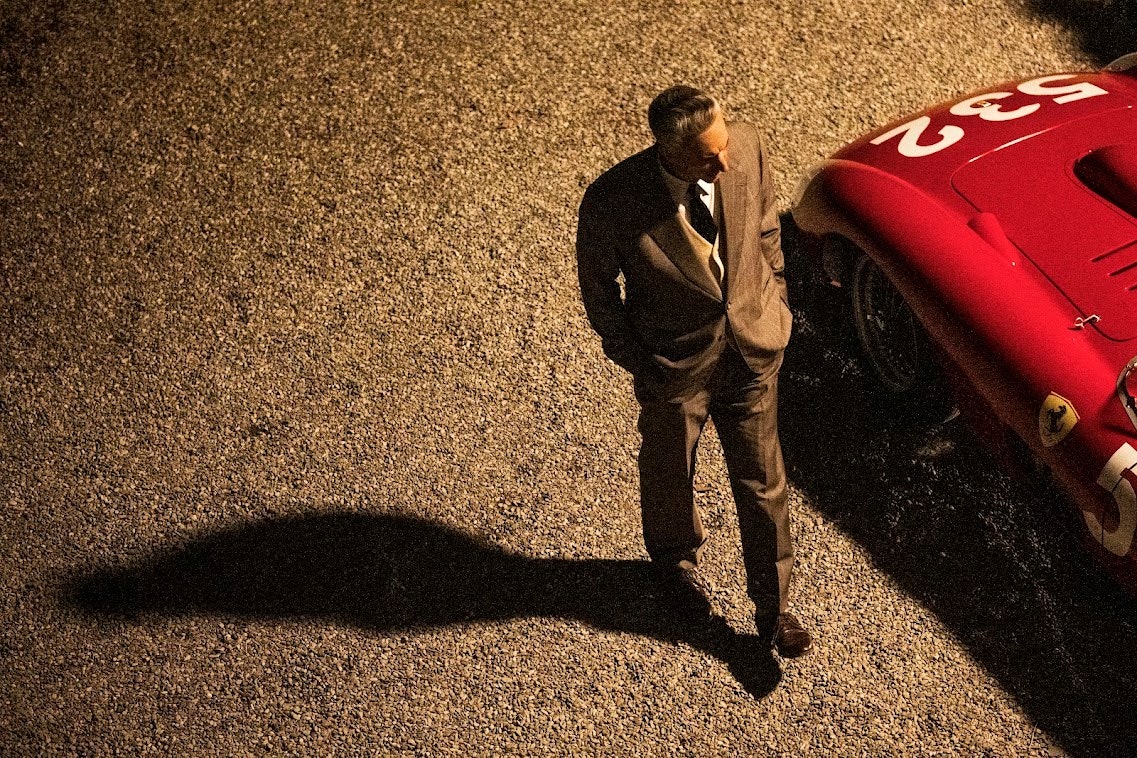Two years ago, the actor Adam Driver starred in a heavily accented film about a great Italian house of industry, a movie delineating a famed family’s squabbles and successes, its difficult wrenching into modernity. That film was, of course, House of Gucci, Ridley Scott’s much anticipated film that delivered some of the desired luxe camp, but was ultimately an uncompelling portrait of European dynasty.
Driver is now taking another crack at the form, in Michael Mann’s Ferrari, which premiered here at the Venice Film Festival on Thursday. This would seem an apt setting for the film’s debut, where audiences can cheer on a home country hero. But Ferrari, being a Mann film, is not prone to rousing celebration. It’s a moodier, more idiosyncratic picture than that, a study in pride and heedless male drive shaped in entirely human dimensions. It’s far more successful than House of Gucci.
The film takes place in 1957, when founder Enzo Ferrari is in his late 50s and is at risk of losing his company. He’s too focused on racing to pay much attention to the company’s commercial output. Some of that distraction may be owed to the recent death of Ferrari’s son, Dino, felled by muscular dystrophy in his 20s and now intensely mourned by Ferrari and his semi-estranged wife, Laura (Penélope Cruz). Driver is, obviously, not in his 50s himself, but some subtle makeup and hair work do a good enough job of convincing us. And anyway, he’s otherwise such a force in the role—in a taciturn, half-gentlemanly way—that one doesn’t much care about a little age fudging.
Ferrari is a story divided in two, balancing Ferrari’s tense determination to have one of his cars win the notoriously demanding, dangerous Mille Miglia road race (and thus, hopefully, giving the company a crucial sales boost) and his tricky domestic life. He’s got a mistress, Lina (Shailene Woodley), stashed away at a country house his wife knows nothing about, as well as a young son, Piero, of whom Laura is most certainly not aware. As the film unfolds, Mann binds these disparate threads into something like one conclusion: an acceptance of error and its consequences is, in life’s pursuits, the only way forward.
Initially, it’s vaguely disappointing how decidedly un-Mann-ishly the film comports itself. The director’s signature cool slickness has been traded for period glow, as characters talk in rooms with little panache. But gradually, Mann’s familiar tics reveal themselves: in pleasingly chunky bits of dialogue (Mann co-write the screenplay with Troy Kennedy Martin), in roaring chase scenes filmed with blunt vigor, and of course in the sunglasses. Driver wears his shades well, and is otherwise a great vessel for Mann’s trademark masculine glide, competence and sharp edges carried with a purposeful grace.
Mann lets the film’s women shine, too. Cruz gets more fire to play with than Woodley—when we first meet Laura, who shrewdly manages the company’s finances, she’s angrily wielding a pistol—but both make their characters register as something like peers of the man at the center. Ferrari is careful to make its people real: complex and capable of change. Just as, say, the smooth operators of Heat were rounded with personal detail. In all that nuanced portraiture, Ferrari may not be as vroom-vroom gung-ho as 2019’s Ford v Ferrari, but Mann’s film is all the more pleasurable for its thoughtfulness and restraint.
Cars do go zoom though, toward triumph and, on more than one occasion, hideous calamity. (One crash is especially gruesome, arriving as a dreadfully invigorating shock.) Ferrari, who is grieving lost friends along with his son, has grown hardened to such tragedy, but the film doesn’t paint him as some unfeeling, tunnel-visioned monster. He simply respects that the men under his command have entered into such risk willingly; the loss is felt, but guilt rarely enters the room. That psychology is credibly mapped by Mann and Driver, the latter so adept at communicating pain dwelling somewhere under a stolid exterior.
Though he has ventured into television recently, Mann’s last film was 2015’s curious, perhaps unfairly maligned hacker thriller Blackhat. It’s been a long wait to see another of Mann’s muscular visions on the big screen, and while Ferrari is perhaps more muted than some might hope for, it’s a pleasure to watch the filmmaker explore some new styles and timbres. Now 80 years old, Mann has made a film that’s more rueful, contemplative than those in his past. Ferrari the man—who was charged with manslaughter for an accident depicted in the film—is neither venerated nor condemned. But he is perhaps understood, as framed by an old master who himself knows a thing or two about building elegant, sophisticated machines.
More Great Stories From Vanity Fair
Peter Thiel, J.D. Vance, and the Dangerous Dance of the New Right
Ivanka Trump, Sensing Power, Slinks Back to the National Stage
An Epic First Look at Gladiator II
Looking for Love in the Hamptons? Buy a Ticket for the Luxury Bus.
The Dark Origins of the True-Crime Frenzy at CrimeCon
Palace Insiders on the Monarchy’s Difficult Year
The Best TV Shows of 2024, So Far
Listen Now: VF’s Still Watching Podcast Dissects House of the Dragon

